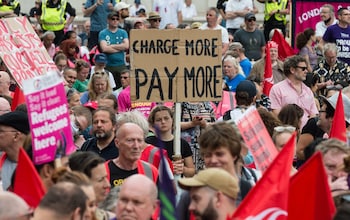Rachel Reeves has indicated she might still raise taxes after the Bank of England cut interest rates for the first time in four years and more than doubled its growth forecast.
The Chancellor warned of “difficult decisions” ahead despite the lower cost of borrowing and substantial upgrade to Britain’s economic prospects – both of which will improve the outlook for public finances.
Threadneedle Street policymakers voted by a majority of five to four votes to lower rates to 5pc from 5.25pc in a “finely balanced” decision, in which governor Andrew Bailey cast the deciding vote.
In a further boost for Labour, the Bank raised its growth forecast for this year from 0.5pc to 1.25pc, following a strong start to the year for the economy.
While Ms Reeves described the rate cut as “welcome news”, she repeated her message of tough choices in her Oct 30 Budget.
Responding to the Bank’s decision, she said: “Millions of families are still facing higher mortgage rates after the mini-Budget. That is why this Government is taking the difficult decisions now to fix the foundations of our economy after years of low growth, so we can rebuild Britain and make every part of our country better off.”
Earlier this week, Ms Reeves said the Government would “have to increase taxes in the Budget,” blaming what the Chancellor claimed was a £22bn black hole left in public finances by the Conservatives.
Autumn tax rises mean any benefit for homeowners and borrowers from lower interest rates may prove short-lived.
Tory leader Rishi Sunak also warned that Ms Reeves’ decision to hand public sector workers a £9.4bn pay rise would jeopardise further rate cuts.
“My concern now is that Labour’s inflation-busting public sector pay rises have put further cuts at risk,” he wrote on social media site X.
Mr Bailey said history suggested public sector pay deals had a limited impact on inflation. But he said that borrowing to fund the settlements could add to price pressures.
“We don’t know [yet] how this is going to be funded,” he said.
The Bank’s governor also cautioned that policymakers were wary as he warned the fight against inflation was not over.
Lower interest rates help to reduce the Government’s debt interest bill, while stronger growth could also hand the Chancellor a boost if it results in stronger pay rises than the Office for Budget Responsibility (OBR) is forecasting.
“Stronger pay growth would certainly be consistent with higher tax revenues,” said Andrew Goodwin at Oxford Economics.
However, Mr Bailey suggested Sir Keir Starmer would find it difficult to meet a goal of raising growth to 2.5pc. “At the moment ... our potential growth rate is below the historic trend [of 2.75pc],” he said.
He added there was “very little difference” between Ms Reeves and her predecessor Jeremy Hunt’s quest for higher growth.
The reduction in borrowing costs is good news for homeowners, with a typical borrower on a tracker mortgage enjoying a £28 reduction in their monthly payments.
However, Mr Bailey signalled that the Bank was not embarking on a campaign of cuts.
Mr Bailey said: “Inflationary pressures have eased enough that we’ve been able to cut interest rates today. But we need to make sure inflation stays low and be careful not to cut interest rates too quickly or by too much.
“Ensuring low and stable inflation is the best thing we can do to support economic growth and the prosperity of the country.”
The Bank now expects the economy to expand by 0.7pc in the second quarter, matching the expansion seen in the first three months of the year that statisticians have described as “gangbusters”. Growth is then projected to slow to 0.4pc in the three months to September.
While policymakers also noted that growth was “stronger than expected” compared with three months ago, they expect interest rates to continue to bear down on the economy and wages. Unemployment is also predicted to rise slightly faster by the end of this year.
Inflation fell back to the Bank’s 2pc target in May. However, the Monetary Policy Committee (MPC) said underlying price pressures remained strong, which suggested rates would “need to continue to remain restrictive for sufficiently long until the risks to inflation returning sustainably to the 2pc target in the medium term have dissipated further.”
A survey by the Bank’s agents showed average pay settlements had ticked up in recent months to 5.7pc, from 5.4pc at the start of the year.
Many employers said they remained “concerned” about the ongoing impact of a higher minimum wage, which the Government has said it wants to raise further.
Companies said they were already cutting hours and increasing non-pay benefits to come with the higher wage demands in order to hand bigger pay rises to their lowest paid staff.
The Bank’s latest forecasts also do not reflect a decision by Rachel Reeves to hand public sector workers pay rises worth £9.4bn this year.
While Thursday’s cut will be welcomed by the roughly 1.2m borrowers on fixed-rate mortgages, savers will lose out, with banks and building societies already cutting rates on some accounts.
The Bank also estimated that a third of the 8m mortgages “are still paying rates of less than 3pc”, with most of these deals expiring by the end of 2026. This suggests many mortgage holders are yet to feel the pain of higher rates.
The Bank also noted that the general election had dampened house buying, although companies said they expected activity to pick up again if borrowing costs fell.
The five-to-four split is the first in a year. The four members who voted to keep rates on hold, included Huw Pill, the Bank’s chief economist.
Mr Pill warned that rising wages remained a danger. “We recognise that there is a need for incomes to recover. But there is a limit to how far that process can go, because if it were to threaten that inflation begins to pick up again ... that would mean higher interest rates,” he said.
Disclaimer: The copyright of this article belongs to the original author. Reposting this article is solely for the purpose of information dissemination and does not constitute any investment advice. If there is any infringement, please contact us immediately. We will make corrections or deletions as necessary. Thank you.



